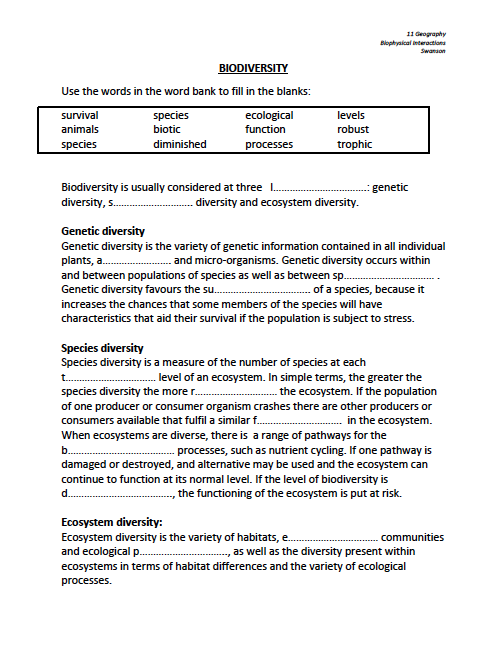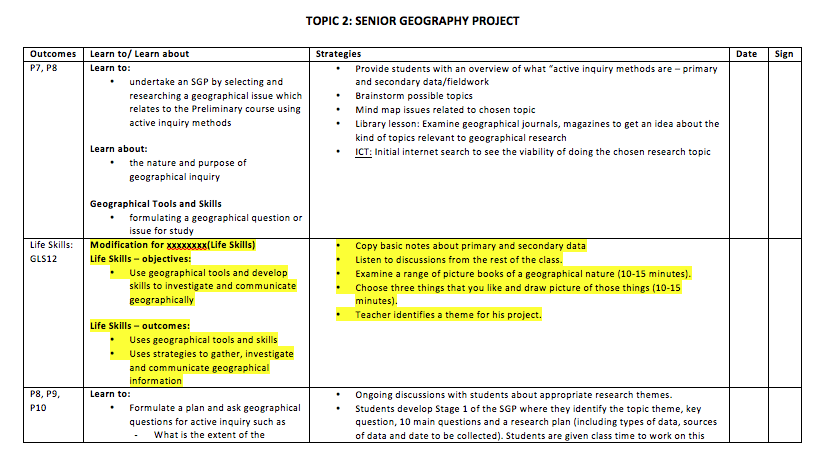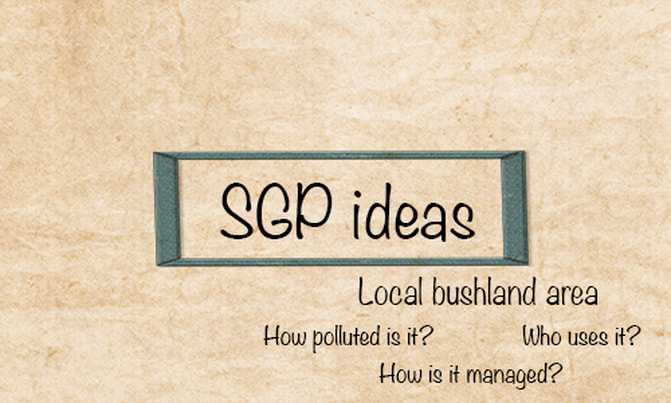|
Students who have experienced significant difficulty completing the 7-10 Geography may consider completing the Life Skills course. For information about how to determine whether a student is suitable for a Life Skills course, and the processes that need to be followed (e.g. consultation with parents, etc), see the HSIE Life Skills course on the NESA website. Preparing for a student completing the Life Skills Preliminary Geography course can be daunting. In many ways it will be like running two courses in the one classroom, but there are ways to make it a bit easier. Here are a few hints and tips... Running two courses at onceWhile Life Skills content and outcomes don't match the mainstream course, there are enough links between the two courses that they can run in parallel. Essentially you will running two courses at once in your classroom. You will run your mainstream course with the majority of your students, and then address the outcomes and content of the Life Skills course at the same time with the one (or couple of) Life Skills student/s. Have a look at the Life Skills course and see where the content and outcomes match the mainstream course. Even if it means rearranging the order, design the delivery of the Life Skills course so that as much as possible you are delivering similar concepts and content at the same time. For example cover the Life Skills content related to recognising physical elements of environments at the same time as mainstream students address content related to biophysical environments at the beginning of the Biophysical Interactions topic. Or cover the Life Skills content on patterns of human activity, when the mainstream class is covering Population. This will mean that all students are part of the same conversations and discussions, but can be given different individual work. It may work out that the Life Skills student can also be involved in some aspects of class group activities, depending on the complexity of the tasks. Seeking supportMake sure that you access any support that you can from the school. This might be the Learning and Support Teacher (LaST) or a Student Learning Support Officer (SLSO). Not everyone is comfortable having a support teacher in the classroom, and you need to work with the person and establish a bit of a routine to make it work well. You will need to get used to having another instructor that might talk when you're asking the students to be quiet, or that repeats instructions, but if this is what has to happen for the student to engage in the work, then you have to deal.Don't expect them to design the resources for the student. Support staff are unlikely to be Geography trained. They might be able to give you some lesson ideas to engage the student, but you will need to design the actual resources. Lesson modificationsModifying class activities might be as simple as giving a few extra clues. For example, you might include a cloze passage in a lesson to help build student literacy skills and provide a quick recap of information. A Life Skills student may require the following modification: - extra time to complete the task (mainstream students might take 5-10 minutes, but Life Skills students may need considerably longer). - some extra clues (e.g. providing the first letter of the answer) - larger text and simplified layout to make it less daunting - one-on-one assistance from the classroom teacher or SLSO. Below is an example of a cloze passage that has been modified, including the downloadable files.
Fieldwork It is possible to lead a Life Skills student through the same fieldwork skills and tools as the rest of your class. If you do activities outside with your class practicing soil testing, water testing, field sketches, etc, the student can still participate in much of this, but may not be able to analyse the results in the same way as the mainstream students. These activities also provide a great way of providing some mentoring and leadership opportunities for your mainstream students. They could take turns in being paired with the Life Skills student to model fieldwork techniques or assist in conducting tests. This is also a nice way to help your students to bond and teaches them some responsibility and understanding. Senior Geography Project and FieldworkThe SGP will need to be scaffolded heavily. You might choose to provide the student with some picture books or geographically themed magazine to help them identify topics they are interested in. Depending on the student's capabilities, it may be the case that the teacher ends up identifying a topic for the student. Unless the Life Skill student's parents are very engaged, it is likely to be easier to develop the SGP project around the school playground so that they can be guided through different parts of the project at school. It might be worth providing the student with a separate exercise book that they keep all their SGP notes, fieldwork, articles, etc in. The teacher or SLSO might find a couple of relevant websites and print them for the student. The SLSO could spend some time in class underlining key points and concepts and helping the student to write a couple of sentences about the topic. The completed assignment for a Life Skills student would include the student's SGP exercise book, as well as a short description on the project. The teacher would need to make a judgement based on the student's abilities regarding the length and depth required. Below: Excerpt from SGP program. Downloadable file below.
Sourcing resourcesIt may be useful to look at resources for lower ages groups/stages. For example, if you are studying Biophysical Interactions you might choose to supplement your resources with activities from Stage 3 Water In the World and Landscapes and Landforms. You may also look at picture books and non-fiction books designed for late primary or early high school. Have a chat with your school librarian about the topics for Year 11 and ask them to find some suitable texts.
0 Comments
The final stage of the Senior Geography Project is a written report. You will need to hand in your Stage 1 information, as well as an analysis of your results. Your report should have the following format: Page 1: Title page with your name, your topic and your subject. Page 2: Table of contents Page 3: Research topic – ten key questions (Stage 1) Page 4-5: Methodology – a description of the research methods that you used. This section should not include your findings, but only the methods you used to find your information. Page 6-15: Research findings and analysis – This section should examine all of your research findings and results and should be set out using questions 1-10 (your initial research questions from Stage 1). You should try to write approximately one page about each of your key questions (this includes any graphs, maps, etc). Page 16-18: Conclusions. What are the general statements you can make about your research? Page 19: Reference list. This section is your bibliography. Page 20-?: The research you conducted for your SGP as a series of appendices.
There are 2 main types of research primary research and secondary research. Finding out about fieldwork: Examine the website About Fieldwork. Practise some of the research methods at Geography Challenge (go to the Virtua Field Trip). You can also see ideas for fieldwork on this website in the following places: - Microclimate fieldwork - Water quality fieldwork - Field sketch - River fieldwork Primary research Primary research refers to research conducted first hand. Examples of primary research: - personal observations - measurements - recordings - photographs taken by you - interviews (e.g. with a local council member, government department, special interest groups) - questionnaires - numerical and graphical data that you collect - ground and oblique photographs that you take - videos that you record Secondary research Secondary research is research that someone else has conducted that you can use and interpret. Examples of secondary research: - maps - numerical and graphical data from the internet, organisations or companies - aerial photographs and satellite images - videos filmed by others - books - journals - pamphlets - journals - newspapers - magazine articles Research Methods - what methods do I use?
What do people think about....? - interviews - questionnaires - letters - meetings - protests What is happening at a particular place...? - observing traffic flow - observing pedestrian flow - observing land use Vegetation measurements... - sampling - random, quadrat methods - height of vegetation - density of vegetation - species identification Slope... - cross-sections - steepness of the slope (clinometer) - aspect of the slope Soils... - soil profile - soil acidity - soil texture - soil moisture content - soil colour Weather... - temperature - rainfall - wind - air pressure - relative humidity - clouds Rivers and Creeks... - measuring changes in channel shape - velocity - discharge - material carried in the stream Pollution... - noise - water - air Part 1: Collecting data
Stage 2 of your SGP involves you collecting all the information and data you will need to complete a report on your assignment (you will do the actual report in Stage 3). You will record your datadigitally, for example in a One Note file. Your folder should be divided into two main sections: Primary Data and Secondary Data. At this stage you will only have to analyse the information you find at a fairly basic level. Part 2: Oral Presentation Stage 2 also involves giving a brief speech on your topic and your findings. In your speech you need to cover the following topics: - What is your research topic? - What are the key research questions you are investigating? - What are the research methods you have used? - What primary information have you gathered? - What secondary information have you gathered? - What conclusions can you make so far about your research? Your speech must go for 4-6 minutes. You must entertain the class and make sure your speech is interesting and informative. You should use overheads, a PowerPoint, video, posters or other visual stimulus during your presentation. SGP Stage 1: Choosing a topic and plan of investigation The first thing you need to do is decide on a topic. Begin by brainstorming as many different ideas as you can. The mind map below already has a few ideas, but you should try to come up with as many ideas as you can. Stage 1 should be set out with the following sub-headings: - Topic Theme - a general topic - Key Questions - this should describe the main aim of the project - 10 Specific Aims/ Questions - this will outline the specific aims of the project - Plan of investigation Topic theme: This title should give a general idea about what your project is about. Some examples are: multiculturalism in Cabramatta, the impacts of new developments in Ryde, the factors affecting vegetation patterns in Epping, landuase patterns surrounding Macquarie University, or urban runoff patterns affecting LAne Cove National Park. Remember that your topic can include both the human side of geography and the physical side. Key question: The key question should give an idea of what the project will be about in general. For example: "What is the state of the environment at the Cumberland Woodlands?", or, "What has been the impact of multiculturalism on the suburb of Auburn?". Project aims: This section should explain what you are setting out to achieve. You should have at least 10 aims. Some examples are: to identify different cultures represented in Cabramatta; to identify the most common crimes committed in Redfern; to identify major sources of urban runoff in Cronulla; to identify the most prevalent vegetation type in Epping; to examine the attempts made by local councils to manage new developments in Homebush Bay. Key words for writing aims: investigate, discover, identify, explain, consider, analyse. Plan of investigation: This section is an outline of sources (both primary and secondary) and the expected time frame. You should also include as much information as possible about contacts, interview questions, fieldwork sites, etc. This section should also have interview questions, survey questions, fieldwork maps attached. An example of how it could be set out is below: Issues to consider: There are several issues you need to think about before you settle on a topic. - Is the topic you have chosen actually geographic? - Are there any laws or ethical issues that will stop you from being able to conduct your research? - Is the issue safe? For example if your topic involved interviewing criminals, this would not be considered a wise topic. - Will you have enough time to complete the topic? If your topic involves looking at how an issue will impact on a place over the next 3 years it will not be suitable. While you will be able to make predictions, you may not be able to study the impacts in detail or complete a thorough analysis. - Your topic should not be so general that the answer to the questions or aims are too obvious, but at the same time it should not be so specific that it is nearly impossible to find information.
|
Categories
All
Archives
May 2024
|
||||||||||||||||||||||||||||||||



